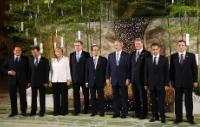The annual summit of world leaders is the focal point of G-8-related activity. The sessions offer national leaders an opportunity to meet with their foreign counterparts and, due to now standard practices of limiting attendance and holding the summits outside national capitals, engage in direct multilateral and bilateral discussions with limited interruptions. Russian President Boris Yeltsin began attending the G-8 summits in 1994, but he was only allowed to attend the special sessions devoted to political affairs. He remained excluded from the main talks devoted to economic questions, where Moscow's global influence was much weaker. At the Denver summit of 1997 a decision was reached to elevate Russia's status to that of a full G-8 member, converting the then G-7 into the present G-8. Yeltsin apparently sought membership for prestige and to vindicate his Western-leaning foreign policies. The collapse of the Soviet Union had left many Russians, let alone foreigners, doubting Moscow's great power status. Western leaders wanted to reward Yeltsin for seeming to align Russian foreign policy largely with the Euro-Atlantic community despite vocal opposition from Russian nationalists and communists, who favored increasingly anti-Western policies.
Why Russia is a G-8 Member but China is Not

